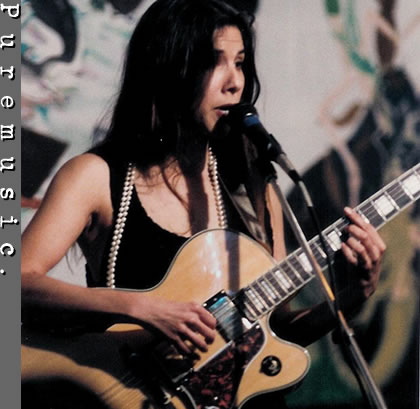
A Conversation
with Joy Eden Harrison (continued)
PM: But before we hit the current work, let's touch on the first album of yours that blew my mind, Unspoken.
JEH: Ah.
PM: Was that cut in southern California or in Chicago?
JEH: That was cut in California.
PM: And with Cindy Lee Berryhill producing or co-producing?
JEH: She was producing.
PM: That was really an astonishing record [see our review], and went on to win you best jazz artist that year by the IMA.
JEH: Right, the Independent Music Awards.
PM: That's quite an honor.
JEH: Oh, my gosh! The biggest thrill of a lifetime. One of the judges was Tom Waits, who is a huge hero of mine. [see our review of the most recent Waits release] And [clarinetist] Don Byron, who was one of the arrangers for Robert Altman's Kansas City [see our review of Byron's own 2004 CD], and Arturo Sandoval, the Cuban horn player. I don't think I've ever received a greater honor in my life.
PM: Now, was there a ceremony anywhere? Or did they send you something, or what--
JEH: Oh, they sent me an award. And it was on the website for the year. It wasn't the glorious accoutrement that came along with it, it was the honor of the people who examined the music.
PM: Of course. And aside from the honor and the prestige of the actual award, did anything else cool spin off that, say event-wise or connection-wise?
JEH: Well, no. And I can't believe the irony of the confluence of situations. At exactly the time when that award came out and things were happening, it was right then that I felt--I was so in debt from the album, and out of time, and so stressed out from music and all the demands of it financially and energetic-wise--because I'd started my own label--that I began looking for what else I needed to do to ground my life. So it was kind of ironic timing for this momentum to build, and then for the platform under me to sort of drop out. I needed to make some other decisions.
PM: Right, about how to make your life make sense fiscally.
JEH: Exactly. But I dreamed of writing them a letter, a personal letter saying, "Thank you. I really appreciate it." I think the world of those artists. But I never did that, and I really wish I had.
PM: Yeah. How did you meet Cindy Lee Berryhill who produced Unspoken?
JEH: Ah, Cindy Lee. She was another person on the San Diego scene. And we met just through friends and through the scene in San Diego. So we'd been talking just for years, and doing shows together. I loved her album Garage Orchestra, and I loved how she considered layering sound. And she had a strong Brian Wilson background, and love, and I thought it might be interesting to work with her. It was actually quite fabulous.
PM: Yeah. And she did a terrific job.
JEH: Yeah.
PM: Are you in contact with her anymore?
JEH: We talk semi-regularly. It's been tapering off a little bit, but she's still out in San Diego, and still--last I heard, she was working on a musical project. continue
print (pdf) listen to clips puremusic home